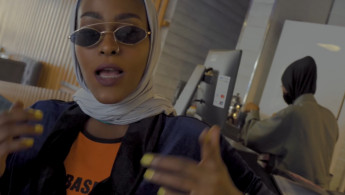Amnesty slams 'hypocritical' Saudi Arabia for arresting 'Mecca Girl' rapper
In a statement relased on Twitter, Amnesty said it was "deeply concerned by the news of Saudi authorities arresting Saudi rap singer Asayel for her song 'Bint Mecca', while the Kingdom sells itself as progressive by hosting major music festivals & international artists. What’s with the hypocrisy?".
Asayel Slay, who is of Eritrean origin, made international headlines last week after uploading the video Bint Mecca ("Mecca Girl") to her YouTube channel. The video shows the hijab wearing young artist rapping in her local Mecca, Islam's holiest city.
The Arabic rap video, praising Meccan woman as powerful and beautiful, is mainly filmed in a coffee shop and features shots of young women wearing hijab socialising and dancing to the song.
The YouTube video garnered more than 1.6 million views in a week before it was taken down.
Read also: Forget reform: Saudi Arabia will now punish feminist women with 'flogging and prison sentences'
However, despite global support for the song, Mecca governor Khaled al-Faisal ordered the arrest of those behind the video, saying in a statement on Twitter that it "offends the customs and traditions" of local Saudis.
A number of comments, using an Arabic hashtag that translates as #You_Are_Not_Mecca's_Girls, claim the women in the video do not represent Saudi Arabia's female population with others making markedly racist remarks against Asayel's African origins.
Twitter Post
|
The move underscores the limits of a recent Western-style liberalisation drive in a society steeped in conservatism. The statement sparked indignation on social media, with many tweeting their support under the hashtag "Mecca Girl represents me".
"I am from Mecca & the only thing I find offensive is your racism, misogyny and your war on a young woman & her artistic expression of her culture & her people," said one Twitter user.
"This is so typical for the #Saudi government - bring Western influencers to artwash the regimes crimes but attack real Saudi women who try to artistically express their cultural identities," tweeted Amani al-Ahmadi, who calls herself a Saudi feminist.
"This is racist, sexist," she adds.
A host of Western women musicians - from Janet Jackson to Mariah Carey and rapper Nicki Minaj - have been invited to perform in the kingdom as its eases restrictions on various forms of entertainment, in a bid to shake off the country's ultra-conservative image.
Minaj, however, pulled out of the concert in what she described as a show of support for women's and gay rights in the kingdom.
De-facto ruler Saudi Crown Prince Mohammed bin Salman has scrapped decades-old bans on cinemas and women drivers, while allowing gender-mixed concerts and sports tournaments.
The relaxed social norms have been welcomed by many Saudis, two-thirds of whom are under-30.
However, despite touting strides in women's rights under Crown Prince Mohammed bin Salman, women's lives in the kingdom remain policed.
A group of Saudi women activists - some early opponents to the since-lifted ban on women's right to drive - remain imprisoned and reportedly subjected to torture.
Critics also say the reforms are designed to facilitate foreign investment and tourism in the country as Crown Prince Mohammad bin Salman attempts to steer the kingdom out of oil dependency.
Follow us on Facebook, Twitter and Instagram to stay connected





 Follow the Middle East's top stories in English at The New Arab on Google News
Follow the Middle East's top stories in English at The New Arab on Google News
![The UAE is widely suspected of arming the RSF militia [Getty]](/sites/default/files/styles/image_330x185/public/2024-11/GettyImages-472529908.jpg?h=69f2b9d0&itok=Yauw3YTG)
![Netanyahu furiously denounced the ICC [Getty]](/sites/default/files/styles/image_330x185/public/2024-11/GettyImages-2169352575.jpg?h=199d8c1f&itok=-vRiruf5)
![Both Hamas and the Palestinian Authority welcomed the ICC arrest warrants [Getty]](/sites/default/files/styles/image_330x185/public/2024-11/GettyImages-2178351173.jpg?h=199d8c1f&itok=TV858iVg)